|
FILM 1 A.D.
A movie review.
SPOILER: He dies in the end. OR DOES HE? Eh? Eh?
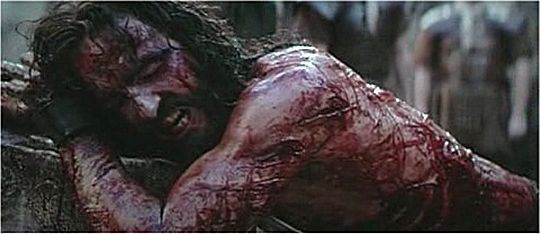
Almost everything you’ve heard about this film is true. It’s a
two-hour slow-motion pop video for sado-masochists. It’s overblown,
pious and wildly pretentious. It’s almost painfully misanthropic.
And it’s certainly a vehicle for Mel Gibson’s crushing sense of
self-loathing.
It’s also fairly impenetrable if you don’t have a fairly good
advance knowledge of TV’s famous The Bible. Characters are rarely
properly introduced or identified - there’s a lengthy bit near the
start, for example, where some wimpy JC lookalike is inexplicably
hounded out of Jerusalem and through the desert by a gang of
horrible children, who then disappear to be replaced by what looks
like a dead camel surrounded by flies, whereupon the bloke hangs
himself from a tree with the camel’s harness For Some Reason. Who he
is or what he’s thinking is anyone’s guess, and the incident is
never referred to again.
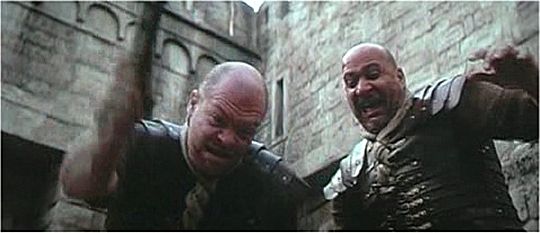
What the film definitely ISN’T is anti-semitic, and anyone
suggesting otherwise should be treated with the utmost suspicion,
for they surely have an agenda of their own. This is a film about
the shitness of people, and about the hypocrisy and evil of
those in power who wish to hold onto that power. The Romans in the
film (above) are, with few exceptions, portrayed as vicious, sneering thugs.
The Jews (below) are depicted, again with few exceptions, as a stupid,
credulous and vindictive mob. Both “sides” get it in the neck
equally from Gibson, yet there’s been no outcry and controversy
about the movie being “anti-Roman”. The Jews are shown as being the
driving force behind Jesus’ torment and execution, but as far as
this reporter can recall that’s how the story is presented in the
book too, so it’s hardly fair to blame it on the screenplay. But
anyway.
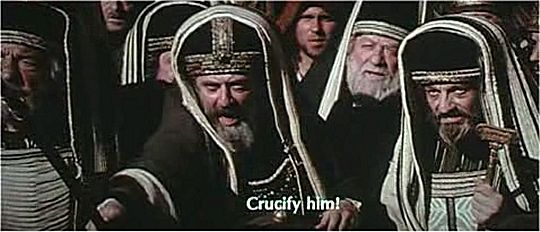
It’s a pretty bad movie, in truth. It starts off like a cross
between The Matrix and Braveheart, with a long scene of unfathomable
mystical bollocks in a misty wood, heavy on hackneyed imagery (the
moon! A snake!) and featuring a mysterious, malevolent-looking bloke
in a cowl (probably Satan himself, as far as we’re informed or are
able to ascertain), a scene which is brought to an end by JC
stomping brutally on the serpent (hey, weren’t you supposed to be
non-violent?), then a short slow-mo swordfight between soldiers and
disciples that appears to end with the Big J sticking a soldier’s
sliced-off ear back on, miracle-healing-stylee.
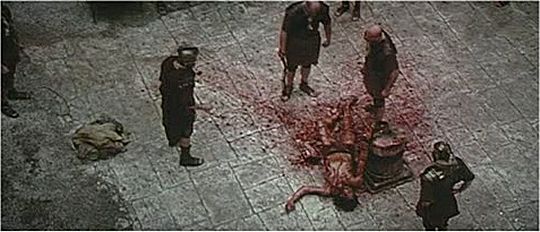
After an opening 35 minutes conducted almost entirely in near pitch
blackness, from then on the film’s pretty much one long drawn-out
torture scene. Our hero gets beaten up by the soldiers, beaten up by
the Jewish priests, ridiculed by Herod and then savagely flogged by
the Romans for about 15 gory, blood-spattered minutes before being
finally delivered back to Pilate – played sympathetically as a
miserable put-upon colonial administrator, caught in a situation he
can’t win, which may be the source of most of the allegations of
anti-semitism – for the infamous hand-washing and condemnation. Then
there’s more beating by brutish and sadistic Roman guards, flogging through the streets
with the cross, and then the crucifixion itself. The only relief is
the occasional short flashback to happy days of innocent carefree
carpentry and such, but there’s barely a 30-second stretch anywhere
in the movie free of fetishistic close-ups of torn flesh and gaping
red wounds.
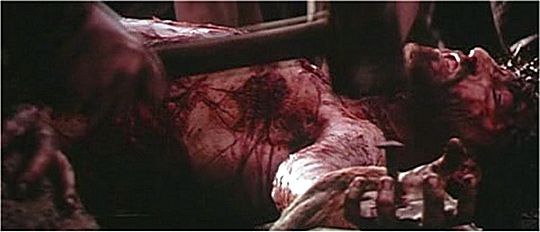
Now, this reviewer has no trouble with accepting that particular fact – the movie is
specifically about one short and bloody period in the protagonist’s
life, and the punishment and execution of the convicted in Biblical
times WAS a horrific and extraordinarily gruesome business. But the
film lingers in what’s an uncomfortably pornographic manner over
both the actions and the results, and one imagines this will be
popular viewing in S&M dungeons for many years to come (which may or
may not have been the director’s intention). It doesn’t just
depict a man’s suffering, it glories and revels and wades in it,
leering lasciviously at the dripping blood and the anguished
screams - as if perhaps Gibson was stung by criticism that William
Wallace's hanging-drawing-and-quartering death scene in Braveheart
wasn't quite unpleasant enough, and decided to really go for it this
time - and if you’re not sure what the artistic motivation behind
that choice is, you may want to check out the “authentic cross-nails
jewellery!” merchandising before arriving at your decision.
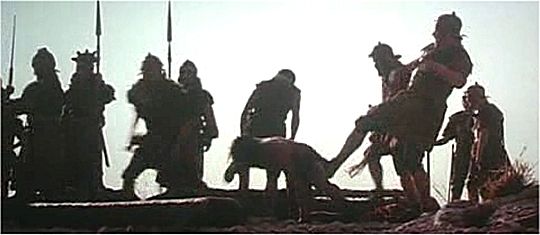
In short, this movie is a fascinating cultural artefact which is
worth a view just to see what everyone’s talking about (and saying
“But I don’t want to fall for the hype by giving them my money”
seems something of an irrelevant point, given that Mel Gibson could
already buy and sell most of the Western world anyway) but if you
know anyone who goes to see it more than once, immediately expunge
them from your life and never talk to them again. They are not to be
trusted, and you’ll probably end up having your tea spiked one day
and waking up chained to a basement wall in a rubber gimp mask
having electrified clamps attached to sensitive parts of your
anatomy by a giggling freak with an oddly familiar silhouette. It’s
undeniably an interesting film, and a bold one to have
released (ancient languages, subtitles and all) but to enjoy it you’d
need to be pretty damn sick in the head.
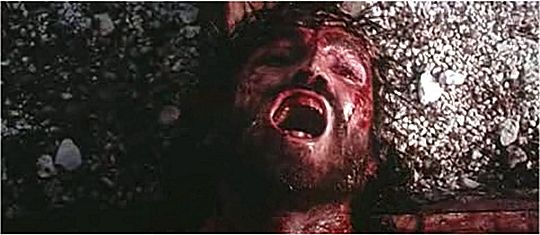
The movie almost rescues its own soul as a message of universal
peace and love towards the end with the non-committal,
non-denominational, non-sectarian quoting to the disciples of
"As I have loved you, so love one another", but then blows it all
moments later with "No-one comes to the Father but by me",
in other words Gibson's real motivation and intended subtext in
making the film: "THE CATHOLIC CHURCH IS THE RIGHT ONE!
ALL THE REST OF YOU WILL GO TO THE ETERNAL AGONY AND DAMNATION OF
HELL NO MATTER HOW GOOD A PERSON YOU ARE!" It's a bit of a shame
that a story so nearly about truth and peace and forgiveness and love
and everything ends up
getting turned into a partisan declaration of war, of course, but
then that's religious fundamentalist fanatics for you. This movie
isn't anti-semitic, but it IS essentially just a party political
broadcast.
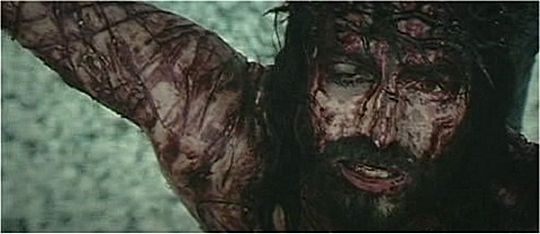
And the moral of the story? Well, this particular minister came away from the
film with his views unchanged. “God” and “the Devil” are just names
we give to things that are inside ourselves, better to pretend that
they’re not within our control, or our responsibility. We bear the
sole burden of our own actions, and must answer to our own consciences
for them. But 2000
years along, it's probably a bit late to start trying to get that one to catch on.
Rev. Stuart Campbell
"Good Friday", "2004" "AD"
|